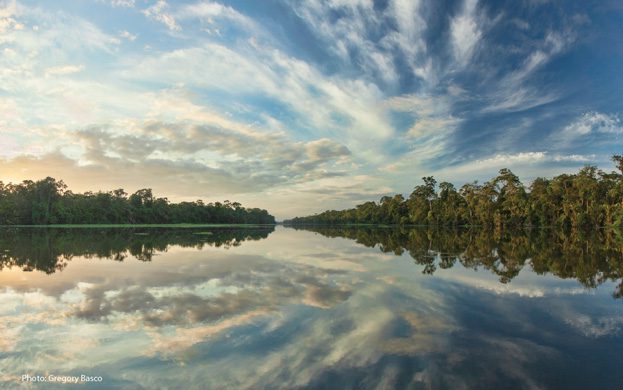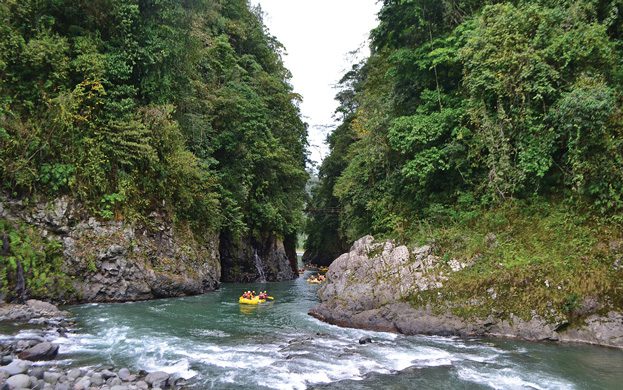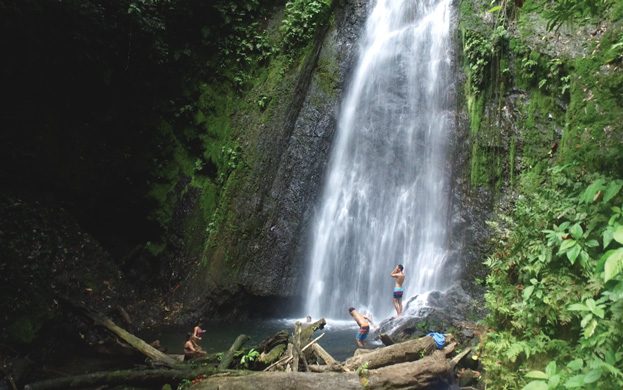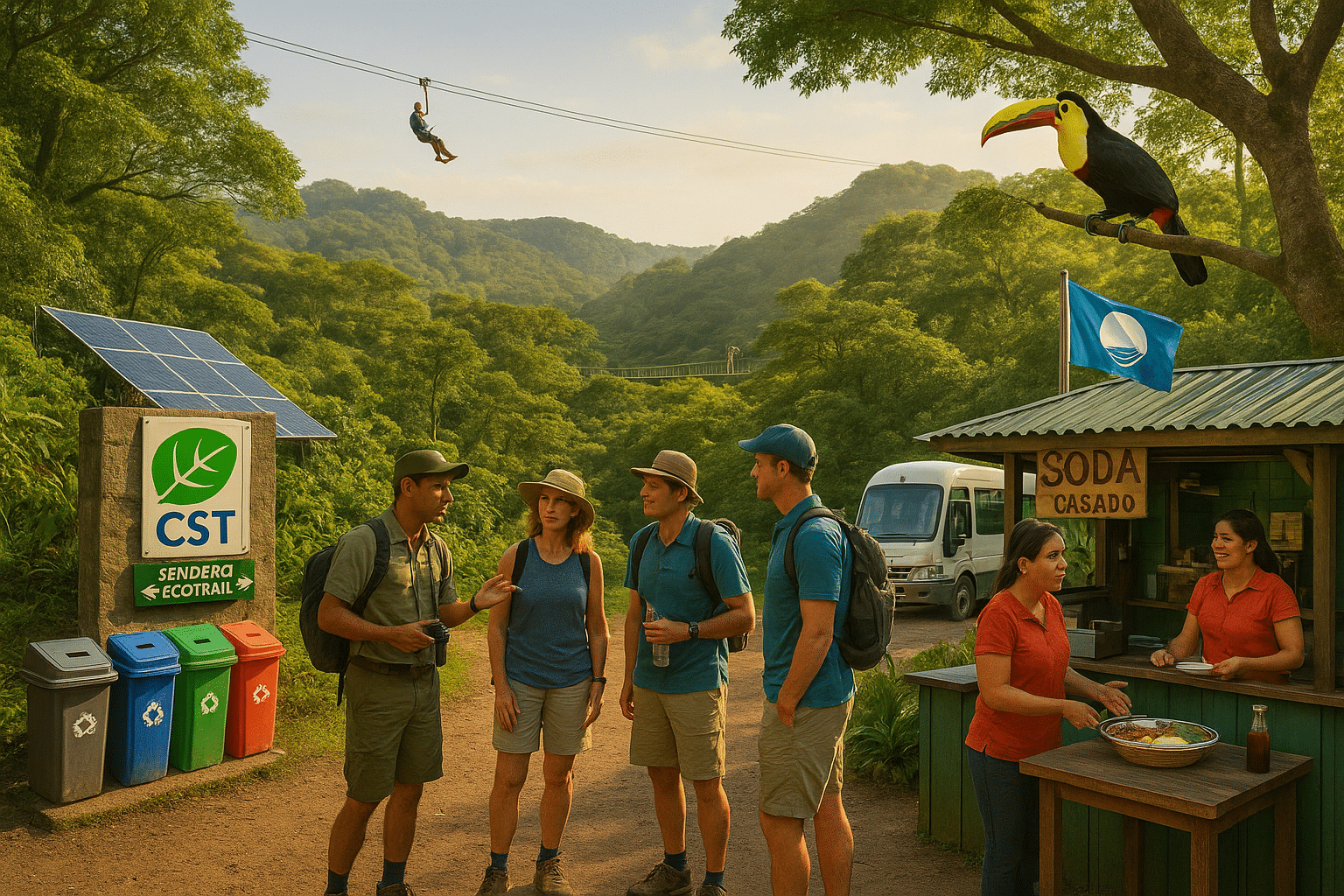Ecotourism in Costa Rica is almost synonymous with sustainable tourism. Ecotourism: If only the subject were as pure and simple as this Merriam-Webster definition makes it sound. Inferences about ecotourism being synonymous with sustainable tourism can be misleading and limiting. When commercial interests are factored into the Mother Nature/human nature equation, neither label tells us enough about people’s green-friendly choices of travel lifestyle or livelihood.
Merriam-Webster’s definition of Ecotourism:
ecotourism
noun eco·tour·ism ˌē-kō-ˈtu̇r-ˌi-zəm , ˌe-kō-
ecotourism: the practice of touring natural habitats in a manner meant
to minimize ecological impact.
How well do they measure up to being economically as well as environmentally beneficial?
Can “eco” and “sustainable” encompass the same yardstick of success in the tourism sector?
There are many indications in this Howler issue that the answer is “yes.” Sustainability and responsibility are intertwined themes in the various ecotourism stories and perspectives featured.
If ecotourism offers infinite ways to soothe our souls, can sustainable tourism save our species?
“Ecotourism is sustainable when everybody wins
— tourists, local people and animals alike.”
Gregory Basco
Deep Green Photography
Foto Verde Tours
Ecotourism: Where the Rubber Doesn’t Hit the Road
Costa Rica has long been recognized as an environmentally conscious country whose leading industry is ecotourism. Since its inception, the term ecotourism, which is often interchanged with sustainable tourism, has been used and misused to inspire travelers to visit destinations with bountiful natural and cultural diversity and wealth. With the rise of technology and the accessibility of international modes of transportation, there are few places that are completely out of reach.
As curious travelers we want to have unique experiences that involve authentic natural and cultural encounters. It is this wanderlust-driven desire that makes ecologically rich and less-visited places prime targets for increased tourism. Getting placed on the tourist map draws attention to once sleepy destinations and in so doing, there is the risk of wildlife and indigenous population exploitation, mismanaged infrastructural growth, environmental destruction and the misappropriation of resources and profits.
Off-grid, eco-friendly visitor experience
is Costa Rica’s new norm
The Economist commented in a Mar. 17, 2018 article on the politics of conservation in Colombia: “At the moment, those involved tend to throw into the pot anything that might vaguely count: ecotourism; wild fruits and nuts that can command a premium price; cosmetics made from forest products that appeal to the virtue-signalling middle classes.”
Fortunately, through ever more rigorous sustainability standards, practices and certifications, many countries, communities, tourism stakeholders and travelers themselves are ensuring that the negative impacts that tourism can inflict on a destination are reduced if not eliminated.

“Broadly speaking, ecotourism can be evaluated at the destination level or down to an individual tourism provider,” says Leon Mach, a resident lecturer in sustainable tourism at the School for Field Studies in Bocas del Toro, Panama and co-owner of SeaState, a university-level sustainable tourism study-abroad program that visits Costa Rica. “And it encapsulates social, environmental and economic impacts of tourism service delivery.”
Other HOWLER Eco-Sustainable Articles
Ecotourism Pioneer: Rafael Gallo – Ríos Tropicales
Osa Peninsula: Corcovado National Park, Puerto Jiménez, Drake Bay, Matapalo
Ecotourism is more complex than many of us probably realize. According to the World Conservation Union, ecotourism possesses the following characteristics: “conscientious, low-impact visitor behavior; sensitivity towards, and appreciation of, local cultures and biodiversity; support for local conservation efforts; sustainable benefits to local communities; local participation in decision-making; and educational components for both the traveler and local communities.”
It is through conscious ecotourism that both the traveler and the local providers (tour operators and guides, transportation companies, lodges and other businesses) can do more than just mitigate the negative impact of tourism; they can actually promote a positive impact. Ecotourism can produce income-generating opportunities for individuals in places where those options were previously limited. It can also generate funding for conservation efforts and the protection of natural areas and resources. Ecotourism also has the power to promote invaluable education, nature and cultural awareness, and activism for more sustainable practices and conservation initiatives.
Many of us are beginning to realize our vital individual and collective role in protecting our planet and all living and non-living natural entities. For this reason, many of us are opting to explore the world with a greener mind and approach to travel. There are far more eco-options these days than ever before. As a traveler, it is wise to understand what makes a tour, activity, accommodation or business eco-friendly and to understand what you can do personally to be a responsible and eco-conscious traveler, whether you are in Costa Rica or another incredible destination on our beautiful planet.
In Costa Rica, there are two prominent certification programs, the Certification for Sustainable Tourism (CST) and the Blue Flag Ecology Program, that businesses and coastal towns can earn for their dedication to the environment and local communities. ”Certifications help level the playing field and reduce greenwashing by evaluating and comparing providers using specific criteria under several categories,” Mach says.

The Certification for Sustainable Tourism evaluates all sectors of the industry in Costa Rica. According to the United Nations, “the Certification for Sustainable Tourism (CST Costa Rica) is one of the first systems, if not the first, to achieve the integration of the principal elements of sustainable tourism, analyzing good management practices, the environmental and social impacts of services, as well as the client’s perception of image and the congruence between the service offered and the product’s promotion.” There are almost 400 tourism companies in Costa Rica that have received this five-level certification.
In 2016, according to the Costa Rican Tourism Board, more than 70 percent of tourists who visited Costa Rica spent some time on the beach. The Blue Flag Ecology Program is a certification that is awarded to coastal communities. It’s divided into 10 categories: beaches, communities, neutral weather, education centers, community health, micro-drainage basins, sustainable homes, special events, protected natural spaces and climate change. This prestigious award is one that has inspired beach towns and businesses to work together to take care of their environment while at the same time sharing it with international visitors.
While Costa Rica, like many other eco-conscious countries around the world, isn’t doing everything right yet in terms of protecting the environment and maintaining a completely sustainable approach to tourism, inspiring progress is continually being made. It is not only the country and the tourism providers that are responsible, though — it is all of our responsibility to tread lightly and consciously and make decisions that not only enrich our personal experiences but benefit the places we visit.
To read more on Sustainable Tourism in Costa Rica and CST Costa Rica program, visit this ICT Website








